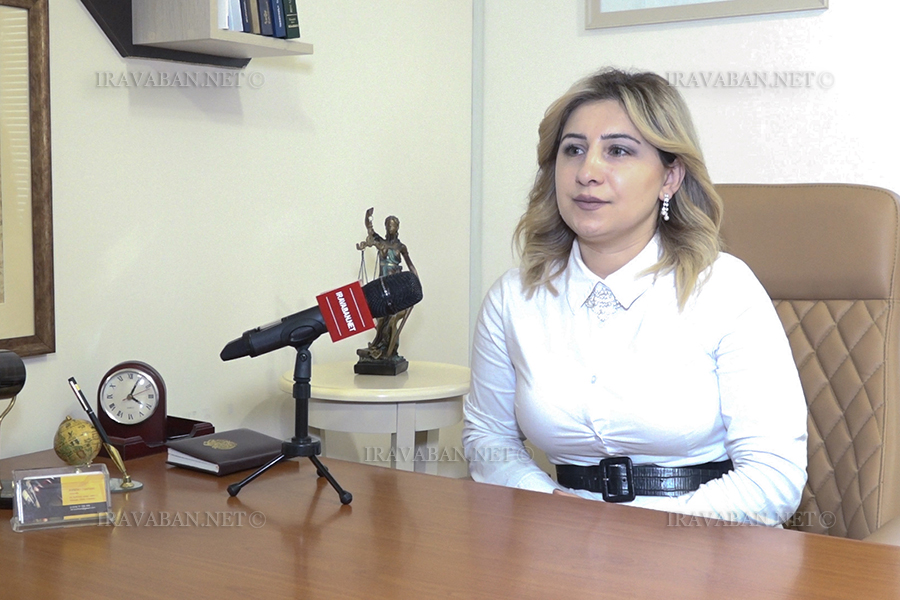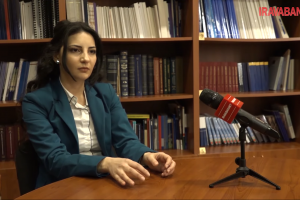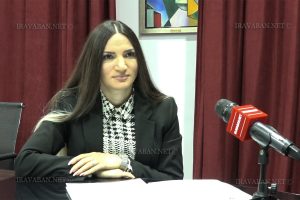From a legal point of view, the vetting of lawyers inadmissible to the extent that advocacy is not a state function and advocates are not officials. Advocate Ashkhen Dashyan said in an interview to Iravaban.net, referring to the speech of the Chairman of the Supreme Judicial Council Gagik Jhangiryan a few days ago, where the latter expressed an opinion on the vetting of advocates saying, “I can say that the process of cleaning and purification should also refer to the advocates’ service, because, unfortunately, it is accepted in our country, for the most part, I do not want to offend anyone, but there are advocates who communicate with law enforcement agencies and courts in various cases very easily get recognition. In other words, this vetting must include the entire judicial system and all the bodies that serve and support it.”
Ms Dashyan noted that vetting is a process of checking the state officials, persons holding positions or serving in public/state structures may be the “target” of vetting. Advocacy is a professional association of lawyers, which, being a civil society institute, does not enter the system of state bodies.
“Vetting refers to public servants, statesmen and politicians, according to which, in the process of checking them, the state pursues, among other goals, the goal of increasing public confidence in them. How do you imagine vetting of the advocate who defends the same public? Here it will have the same punitive function; it will be a direct intervention in the independence of the advocate, human rights activities, and the activities of the advocate in the justice system are of key importance. That professional work is subject to special guarantee,” Dashyan said.
According to the lawyer, international standards provide important guarantees for advocates, according to which the lawyer effectively protects the rights of his/her clients, provided that conditions of independence and protection of legal secrets are protected.
She referred to the Recommendation No. R (2000) 21 of the Committee of Ministers to Member states on the freedom of exercise of the profession of lawyer, Adopted by the Committee of Ministers on 25 October, 2000, according to which “all necessary measures should be taken to respect, protect and promote the freedom of exercise of the profession of lawyer without discrimination and without improper interference from the authorities or the public”. “Thus Vetting of advocates is inadmissible, in addition it is incompatible with professional work of the advocate.”
Ashkhen Dashyan is hopeful that the state will not perform a function that has no legal basis in a state governed by the rule of law. “Nevertheless, if it becomes a reality, I am convinced that the legal community will take steps,” she said, adding that the professional work of a lawyer is an integral part of the justice process, and vetting of advocates will weaken the human rights work, the lawyer’s public authority and independence, which are important guarantees for the effective protection of individuals’ rights.
Referring to the fact that Gagik Jhangiryan justified his opinion, saying that today many lawyers are gaining recognition, as they very easily communicate with law enforcement agencies and courts in various cases, the lawyer said.
“I am not aware of such situations, however, if the term “easily communicate” “easily communicate” that Mr. Jhangiryan mentioned, refers to the involvement of a lawyer in corruption or other crimes, then sanctions for such criminal acts, deprivation of a license are already provided by current laws. If such a fact is discovered, there are the same legal consequences now, what is the logic of investigating and prosecuting another act in the same proceeding?”
According to Dashyan, it should also be taken into account that every lawyer carries out his/her activities in the private sector, in private legal relations, and the state cannot conduct vetting in the private sector, check the quality, integrity, ethics and values of the work done by a specialist in the private sector.
According to her, if the purpose of vetting of advocates is to check illegal actions, integrity, ethics, honesty, values, and professional qualities and apply sanctions, in this case, currently, according to some laws, there are measures of responsibility against lawyers, depending on the characteristics of the act and behaviour.
“For example, the RA Law on Advocacy provides for the application of liability and initiation of disciplinary proceedings against an advocate based on the communications. The Constitutional Law “Judicial Code” provides for application of judicial sanctions, as well as the obligation of the court to provide information to the Chamber of Advocates if the advocate committed violations of the code of conduct that questioned the lawyer’s integrity,” she said.
Referring to the statement of a group of lawyers that vetting is also a basis for reform and reform can also be implemented through the formation of unions, Ashkhen Dashyan said:
“I am not in favour of the division of the Chamber of Advocates, in my opinion, the division will weaken the independence of our institution, and the formation of unions cannot be effective.”
Lusine Hakobyan


















